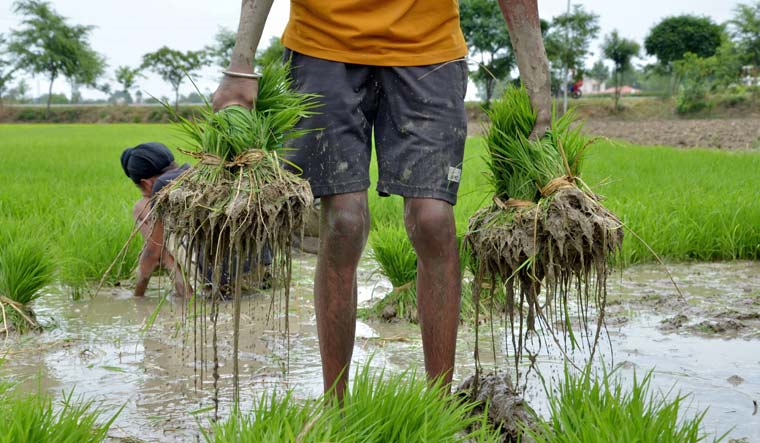
The Farmers’ Produce Trade and Commerce Bill, 2020, that was passed by Parliament are structurally positive but come with a set of challenges. This bill is aimed at the creation of an ecosystem for farmers and traders, wherein both parties could enjoy freedom of choice relating to sale and purchase of farmers’ produce.
Experts, however, say that there are challenges associated with it as there is a concern about the imposition of the Essential Commodities Act (EC Act) in case of extraordinary rise in prices. Stock limits will only be imposed under ‘exceptional circumstances’. It also talks about contract farming but the rules need to be defined. Also, there are concerns that since agriculture is a state subject, these reforms would have to be taken up by the respective state governments and, in turn, the Centre is seeking to take away powers of the state governments by amending another law.
As per a report by Motilal Oswal Institutional Equities, farmers in India faced several restrictions in marketing their produce and were restricted from selling their agricultural produce outside the notified APMC market yards. They also had to sell the produce to only registered licensees of the state governments. Further, barriers existed in free flow of agriculture produce between various states owing to the prevalence of multiple APMC legislations enacted by the state governments.
“The new legislation would create an ecosystem where farmers and traders would enjoy freedom of choice in sale and purchase of agri-produce. It would also promote barrier-free interstate or intrastate trade and commerce outside the physical premises of markets notified under the state agricultural produce marketing legislations. The bills would also open up more choices for farmers, reduce marketing costs and help them in getting better prices. At the same time it would also help farmers of regions with surplus produce to get better prices and consumers of regions with shortages, lower prices,” said Sumant Kumar, research analyst at Motilal Oswal Institutional Equities.
The bill has also proposed an Electronic Trading Transaction Platform to ensure seamless electronic trade and the farmers will not be charged any cess or levy for sale of their produce under this Act. Additionally, there would also be a separate dispute resolution mechanism for farmers. Interestingly, the bill aims for ‘One India, One Agriculture Market’ and also creates additional trading opportunities outside the APMC market yards to help farmers get remunerative prices due to the additional competition. This would supplement the existing Minimum Support Price (MSP) procurement system, which also provides stable income to farmers. For instance, the bill would highly benefit maize farmers as, besides its traditional uses, maize is an important raw material in the food processing, poultry, dairy, meat, and ethanol industry. Maize is produced through the year in south and central India and in Bihar. While farmers in Bihar sell their produce (maize) at a lower price locally, processing units in Namakkal (Tamil Nadu) pay all year round. This gap can be bridged if inter-state trading is allowed.
Experts from Motilal Oswal point out that the bill may go a long way in empowering the farmers as it seeks to provide a national framework on farming agreements that would protect and empower farmers to engage with agri-business firms, wholesalers, exporters or large retailers for farm services and sale of future farming produce. This would be done at a mutually-agreed remunerative pricing framework in a fair and transparent manner and for matters connected therewith or incidental thereto.
“Indian agriculture is characterised by fragmentation due to small holding sizes and has certain weaknesses such as weather dependence, production uncertainties and market unpredictability. These factors make agriculture risky and inefficient in respect of both input and output management. The new legislation would empower farmers to engage with processors, wholesalers, aggregators, wholesalers, large retailers, exporters, etc. without any fear of exploitation, thus, creating a level playing field. It would transfer the risk of market unpredictability from the farmer to the sponsor and also enable the farmer to access modern technology and better inputs. It would also reduce the cost of marketing and improve income of farmers,” added Kumar.
Experts from Motilal Oswal further feel that there is a concern about the imposition of the Essential Commodities Act (EC Act) in case of extraordinary rise in prices and there should be a third party to define the extraordinary rise, and not the government. The report points out that though contract farming is good, rules need to be defined as a bumper crop causes prices to crash. “In such cases, a corporate would choose not to pay the original price and instead buy what it needs from the open market at a much cheaper rate. On the other hand, for some reason, if prices skyrocket during the harvest season, the farmer could feel the sale to the corporate is not as profitable as in the open market sale.
Experts further point out that since agriculture is a state subject, these reforms would have to be taken up by the respective state governments. New laws will lead to hoarding of produce and black-marketing. “The Centre is seeking to take away powers of the state governments by amending another law. The common man would suffer and there would be a price rise (the opposition party and few state governments have raised this issue). Besides this, there is also a need to monitor data to assess the extent of transactions outside of the APMCs. The only other way of knowing what is happening in a ‘trade area’ is to make it mandatory for all warehouses to register with the Warehousing Development and Regulatory Authority (WDRA),” said Kumar.
Farmers are also apprehensive that once these bills are passed, it would pave the way for dismantling of the MSP system, though Prime Minister Narendra Modi has assured farmers that the MSP system would stay along with the government procurement. There is also a concern that the bills would further shrink revenues of state governments, especially the mandi tax as Punjab and Haryana levy taxes on their APMCs. These taxes are paid by the Centre to the states and the APMCs.
“The agriculture bills basically empower the farmers to directly sell to the buyers—be it large corporates or the kirana shop round the corner, without going through the mandi or through the intermediary. It is not that the mandi and intermediaries are getting banned or made illegal where they just vanish overnight. The answer lies in transparency. There is a need to bring in a sense of responsibility to the mandi operators and regularise the mandis and intermediaries. The need to be sensitised about the importance of transparency in the agriculture supply chain and empower them to play a positive role,” pointed out Palat Vijayaraghavan, founder and CEO, Lawrencedale Agro Processing (LEAF).
He further pointed out that new bills will give fresh impetus to the many corporates who are looking to directly engage with farmers. The responsibility lies with corporates to ensure that they take all stakeholders forward and ensure that the tide rises for all in a village economy.

